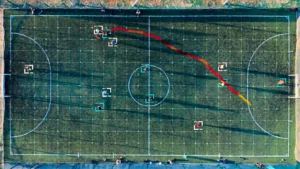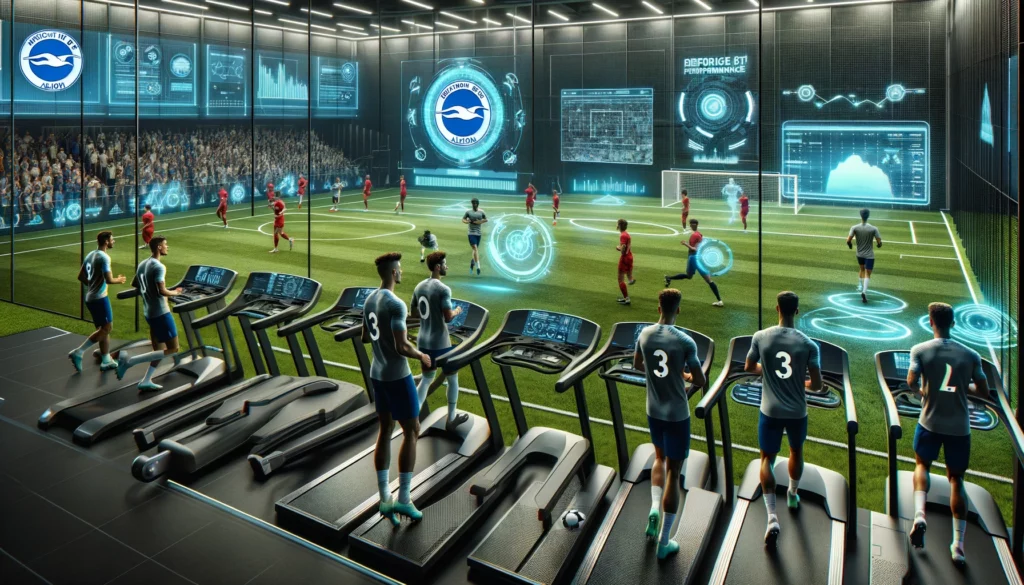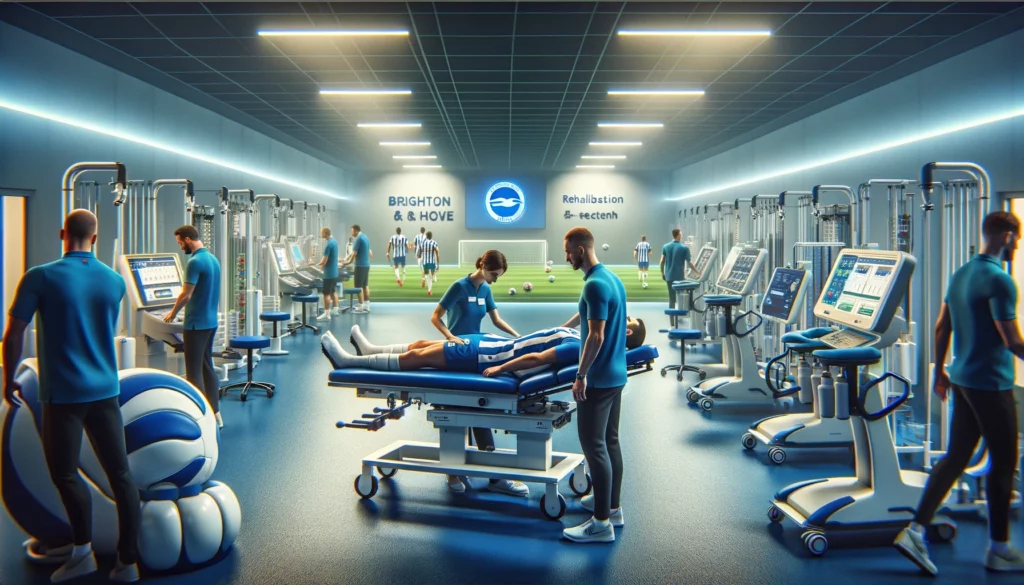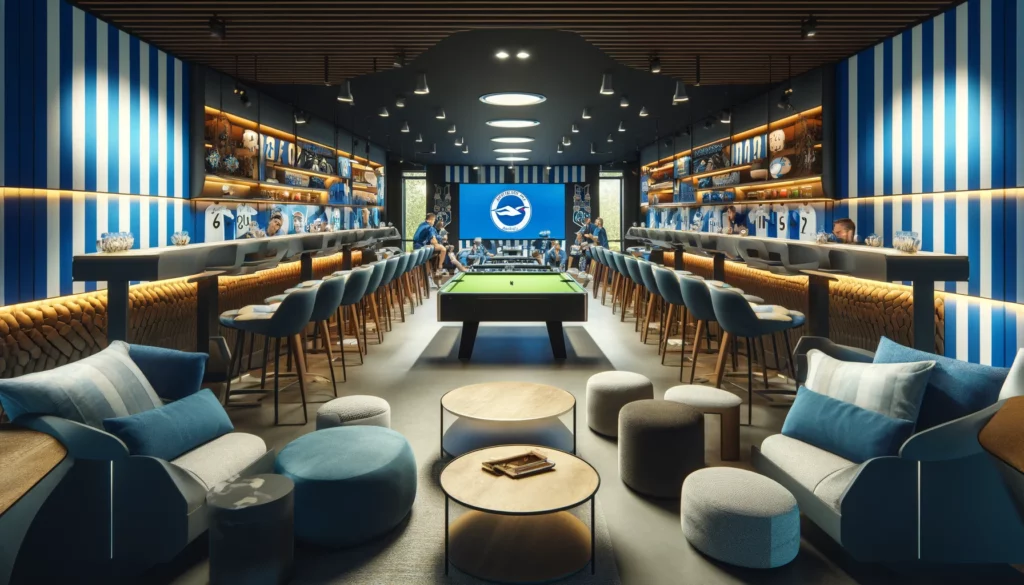
Brighton & Hove Albion (Brighton for short) has grown from a club that long played in England's lower leagues to a permanent fixture in the Premier League. This impressive rise is the result of a careful integration of high-tech video analysis, artificial intelligence and a particularly sophisticated scouting system that sets the club apart from its competitors.
Brighton has taken a number of strategic measures to secure its current success in the Premier League. These range from improving infrastructure, coaching and management to promoting a strong club culture.
Brighton has invested heavily in its infrastructure. The American Express Community Stadium, which has been home to the club since 2011, has been continuously modernised to improve the spectator experience and create better facilities for the players. The Elite Football Performance Centre has also been expanded and is one of the most modern training facilities in England, offering players excellent conditions for their development.
Despite having fewer financial resources compared to the biggest clubs in the league, Brighton has managed to achieve sustainability through clever financial management and targeted investment in player transfers and infrastructure. The club has focussed on finding and developing talent that can be sold at a higher market value, generating additional revenue.
Brighton has always placed great emphasis on attracting highly qualified coaches and technical staff. The appointment of Graham Potter as coach for 2019 was an important move as he is known for his progressive playing philosophy and innovative approach. Potter and his team have improved the team's tactical flexibility and playing performance, which has led to more consistent performances in the league.
Another important aspect of Brighton's strategy is to create a strong and inclusive club culture. This culture not only encourages the integration of players from different backgrounds, but also improves overall morale and engagement within the team. Brighton places great emphasis on community involvement and works closely with local organisations and fans to establish the club as an integral part of the local community.
Brighton has also invested in the youth academy and the development of young talent. The club has a clear strategy of nurturing young players and integrating them through the ranks into the first team. This not only helps to reduce the cost of expensive transfers, but also helps to retain players at the club in the long term.
Finally, Brighton has also taken steps to expand internationally and strengthen its global brand. These include strategic partnerships, international pre-season tours and social media campaigns to expand the international fan base and tap into additional revenue streams.

As previously mentioned, Brighton has revolutionised its match analysis and training methods through the use of cutting-edge technology. The combination of detailed video analysis and AI-based data processing allows the coaching staff to optimise individual and team strategies with unprecedented precision. These technological tools make it possible to better understand player performance and make more precise decisions based on this.
Brighton has developed its own evaluation system that uses extensive data analyses to accurately assess the skills and potential of players. The system not only assesses technical ability and match performance, but also takes into account psychological factors and adaptability. The AI supports the system by extracting patterns and trends from a database of football matches around the world, allowing scouts to spot talent that may have been overlooked by other teams.
The effectiveness of Brighton's scouting system is reflected in some remarkable transfers that have not only been successful on the pitch, but have also brought in a considerable financial profit. Players such as Yves Bissouma and Ben White were bought for relatively little money and sold for many times more after their development. These transfers show how Brighton were able to create significant value through intelligent scouting and the development of players within their own system.

Moises Caicedo, a midfielder from Ecuador, has undergone a remarkable development since joining Brighton & Hove Albion in early 2021 before moving to Chelsea FC for a record fee in 2023. Here is a detailed overview of his career:
Arrival in Brighton
Brighton & Hove Albion signed Moises Caicedo in January 2021 for around £4.5 million from Independiente del Valle, a club known for its excellent youth work in Ecuador. Caicedo has already caused a stir in the Ecuadorian league and national team, where he is regarded as a dynamic and technically skilful midfielder.
Integration and customisation
After his arrival in England, Caicedo had to get used to the physical and tactical demands of the Premier League. His first few months at Brighton were a time of learning and adaptation, both on and off the pitch. Despite limited playing time in his first season, Caicedo worked hard on his fitness and understanding of English football.
Breakthrough and performance
In the 2022/2023 season, Caicedo established himself as a key player in Brighton's midfield. His impressive performances, which are a combination of excellent passing, tactical understanding and physical presence, made him one of the league's most exciting young talents. His influence on Brighton's game helped the club to consistent performances and a place in the top half of the table.
Interest from top clubs and move to Chelsea
Due to his outstanding performances, Caicedo attracted the interest of several top clubs, including Chelsea. In the summer of 2023, Chelsea secured the midfielder's services for a transfer fee of £115 million, which set a record for a sale by Brighton. This transfer underlined Caicedo's enormous rise and his value on the international transfer market.
Importance of the transfer
The sale of Caicedo for such a large sum was not only a financial gain for Brighton, but also a testament to the effectiveness of their scouting and development programme. The club had managed to turn a relatively unknown talent into one of the most sought-after players in Europe. This success underlines Brighton's reputation as a club capable of developing young players and making them competitive at the highest level.
Caicedo's move to Chelsea FC marks the pinnacle of his development and Brighton's successful approach, which has the potential to shape the club in the long term.

The future looks bright for Brighton as the club continues to invest in its analytical capabilities and scouting network. The integration of real-time data analysis during matches and further refinement of the AI system could help Brighton further improve its performance and cement its position in the top half of the Premier League, but the challenges remain significant. To remain competitive in the dynamic environment of the Premier League, Brighton must constantly refine and adapt its methods. Investment in the youth academy and modern player analysis are just as important as the continuous development of the club's infrastructural and technological resources.
It is important that Brighton maintains a clear identity and philosophy that characterises the club on and off the pitch. The connection with the local community and fans must be strengthened to ensure continued support and identification with the club. This will not only help to secure a loyal fan base, but also position the Brighton brand more strongly internationally.

Brighton have shown how strategic management, innovative scouting methods and effective player development can be combined to achieve considerable success in one of the toughest football leagues in the world. The case of Moises Caicedo clearly demonstrates how Brighton can identify, nurture and ultimately sell talent at a significant profit. This ability to develop players and sell them at top prices is a key pillar of Brighton's business model, making the club not only sustainable in sporting terms but also financially.
At a time when financial strength often determines sporting success, Brighton is showing that smart planning and sustainable development can also be routes to success. By continually improving its scouting network and utilising advanced technology to assess and develop players, Brighton has shown that it is possible to compete with the more financially strong teams while remaining healthy and progressive.
With perseverance, innovation and a clear focus on long-term strategies, the club can not only maintain its position in the Premier League, but continue to build on it in the future. The story of Moises Caicedo may be just one chapter in Brighton's recent history, but it is a clear example of the effectiveness of the methods that have made Brighton a model club for modern football management.